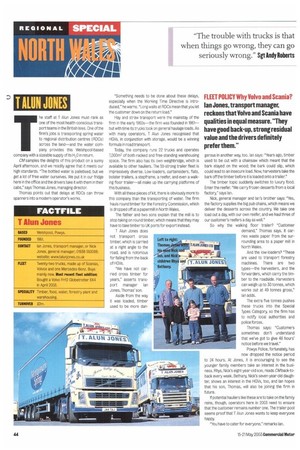T MN JONES
Page 44

If you've noticed an error in this article please click here to report it so we can fix it.
The staff at T Alun Jones must rank as one of the most health-conscious transport teams in the British Isles. One of the firm's jobs is transporting spring water to regional distribution centres (RDCs) across the land—and the water company provides this Welshpool-based company with a sizeable supply of its H20 in return.
CM samples the delights of this product on a sunny April afternoon, and we readily agree that it meets our high standards. "The bottled water is palletised, but we get a lot of free water ourselves. We put it in our fridge here in the office and the drivers take it with them in their cabs," says Thomas Jones, managing director.
Thomas points out that delays at RDCs can throw spanners into a modern operator's works, "Something needs to be done about these delays, especially when the Working Time Directive is introduced," he warns. "Tong waits at RDCs mean that you let the customer down on the return load."
Hay and straw transport were the mainstay of the firm in the early 1960s—the firm was founded in 191— but with time its trucks took on general haulage loads. As with many operators, T Alun Jones recognised that HIGVs, in conjunction with storage, would be a winning formula in road transport.
Today, the company runs 22 trucks and operates 7,000m2 of both racked and free-standing warehousing space. The firm also has its own weighbridge, which is available to other hauliers. The 55-strong trailer fleet is impressively diverse. Low-loaders, curtainsiders, flats, bolster trailers, a stepframe, a reefer, and even a walking floor trailer—all make up the carrying platforms of this business.
With all these pieces of kit, there is obviously more to this company than the transporting of water. The firm hauls round timber for the Forestry Commission, which is dropped off at a papermill in North Wales.
The father and two sons explain that the mill is to stop taking on round timber, which means that they may have to take timber to UK ports for export instead.
T Alun Jones does not transport cross timber, which is carried at a right angle to the road, and is notorious for falling from the back of HGVs.
"We have not carried cross timber for years," asserts transport manager Ian Jones, Thomas' son.
Aside from the way it was loaded, timber used to be more dan gerous in another way, too, an says: "Years ago, timber used to be cut with a chainsaw which meant that the bark stayed on the wood: the bark could slip, which could lead to an insecure load. Now, harvesters take the bark off the timber before it is loaded onto a trailer."
The timber topic suddenly switches to luxury food. Enter the reefer. "We carry frozen desserts from a local factory," says Ian.
Nick, general manager and Ian's brother says: "Yes, the factory supplies the big pub chains, which means we deliver the desserts across the country. We take one load out a day, with our own reefer, and we haul three of our customer's reefers a day as well."
So why the walking floor trailer? 'Customer demand," Thomas says. It carries waste paper from the surrounding area to a paper mill in North Wales.
And the low-loaders? "These are used to transport forestry machines. There are two types—the harvesters, and the forwarders, which carry the timber to the roadside. Harvesters can weigh up to 30 tonnes, which works out at 49 tonnes gross," Ian adds.
The extra five tonnes pushes these trucks into the Special Types Category, so the firm has to notify local authorities and police forces.
Thomas says: "Customers sometimes don't understand that we've got to give 4E1 hours' notice before we travel."
Powys Police, fortunately, has now dropped the notice period to 24 hours. At Jones, it is encouraging to see the younger family members take an interest in the business. Rhys, Nick's eight-year-old son, reads CM back-toback every week. Bethany, Nick's seven-year-old daughter, shows an interest in the HGVs, too, and Ian hopes that his son, Thomas, will also be joining the firm in future.
If potential hauliers like these are to take on the family reins, though, operators here in 2003 need to ensure that the customer remains number one. The trailer pool seems proof that T Alun Jones wants to keep everyone happy.
'You have to cater for everyone," remarks Ian.




























































































































































